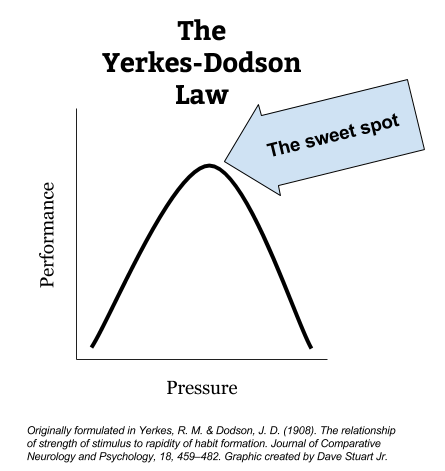The Yerkes-Dodson Law holds that the relationship between pressure (or stress) and performance is shaped like a bell curve. Place no pressure on a person at all, and their performance will likely be negligible; place the entire universe on their shoulders, and their performance will be similarly bad.
Unfortunately, I know very few teachers who don't operate on the far right of that curve — they feel the pressure of the tests and the standards and the curricula and the rosters and the bell schedule and the meetings and the responsibilities at home. They work in the pressure equivalent of the Mariana Trench, and, shockingly, they don't perform to their potential — not even close.
The wise administrator sees this as the threat to student achievement that it is: an over-stressed faculty is an under-performing one. So she shields her faculty from initiatives that add one more thing to the plate, she's wary about meeting just to meet, she's repetitive about what each department is seeking to accomplish, and she's vigilant in cultivating an Everest-orientation.
But the wise teacher sees that he has agency in determining how much pressure will affect him. He focuses on what he can control, reminds himself of what he's here for to begin with, dedicates himself to the most important work and satisfices (and sometimes skips) the rest, and constrains his working hours.
If you're stuck on determining what the most important work is, I'll throw two recommendations into the ring:
First, Mike Schmoker's in Focus:
- Solid lessons
- Viable curricula
- Authentic, redundant literacy
Second, my Foundations Framework, which in so many ways is just my meditation on Mike's work:
- Noncognitive factors
- Knowledge– and argument-rich curricula
- Frequent and purposeful reading, writing, speaking, and listening
[Author's note: I've updated this framework into the hyper-practical These 6 Things.]
The unacceptable, unsustainable, and unworthy situation is the one in which we continue to work under pressures beyond Yerkes and Dodson's “sweet spot.” Some of that is up to people up the food chain (God bless them; I mean that), but a whole lot of it is up to us, too.[hr]
I give a keynote that addresses the Yerkes-Dodson Law and its implications for K-12 teachers. It's called Never Finished: Continually Becoming the Teacher We Set Out to Be, and Staying Sane in the Process. Learn more about my keynotes here.

Leave a Reply